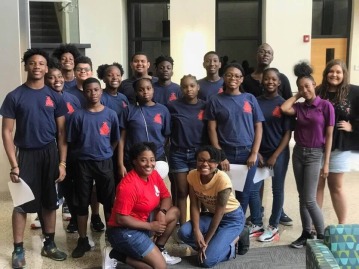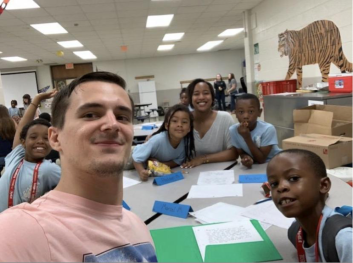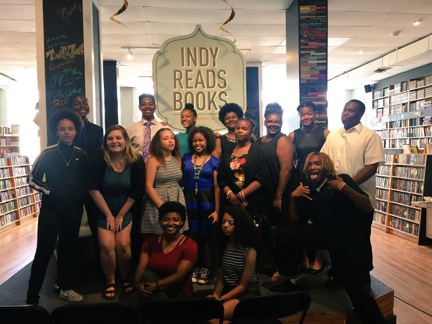by Alyssa Huckaby

As I sat at my kitchen table with a slice of toast with avocado sprawled on top of a layer of cream cheese, I found myself drawing near to comforting words in a devotional online. The author focuses on how death brings forth life, how the underappreciated can ultimately bring about beauty. She does this through one overarching metaphor: the avocado. I looked down from my computer and to the smear of greens, yellows, and white on my toast. *I am not a fan of food metaphors, quite frankly.
As soon as she spoke of her metaphor, I was turned off. All I saw was a blunt and obvious way to make connections and draw conclusions…something I have worked hard against as a writer, which is not necessarily a good thing to do, but I do so damn well because I am as lost as the next person attempting to write something brilliant. I write words until they no longer string together and fall out of my fingertips to my keyboard. But this writer took a plunge into a new way of seeing the avocado and spoke mainly on the nut. She wrote on the fact that the nut itself is the bearer of fruit; it is the dull, deadness that brings about the color and liveliness we all have grown to love and see. **It is the only stuff we don’t throw away when cutting the avocado, but to save the nut and use it as replenishment was an idea I had never truly thought on.
I looked back down at my plate and saw not only the avocado slices, but the entire avocado unsliced, then split down the middle and bearing the fleshy fruit and it’s round, brown nut. The skin is tough and textured, ready to take on the elements in nature and yet it is still soft enough to puncture with even the pressure of a long fingernail. Underneath the skin is the mesocarp, in between the exocarp and the endocarp. Who knew an avocado could sound so biological, so natural. And the pit, the nut…whatever you prefer; It brings about all of the above. It is a bearer of life and is unappreciated. In comparison to the green fruit that it is awkwardly nestled in, it is the rounded, hardened, browned bearer of life. It’s so easy to get swept into a whirlwind of thoughts brought on by something like a metaphor in a piece of writing. So, I whirl with it and take the ride.
How do I do it? How do I bear fruit and what does my fruit look like?
I am a future educator who won’t necessarily be able to reach every student the way I want to, but my heart will bleed openly and readily for all of them. I will hold back tears and fight battles that are too great for me to handle, but I will do it anyways.
I am an intern and editor for some of the brightest, radiating-with-light humans to exist in this world. They pick up the blue and green pencils, look up at me and into my eyes as if to say: I’m ready to share my story. And some of them do, but some of them don’t always, but I am still there to look back into their cheeky, faultless faces and respond with: I am ready to share your story.
I am a writer struggling to make meaning out of my thoughts. I enter into a daze in front of my screen or paper; I can’t seem t unhinge myself from the frame of everyday life to get the freaking words down.
I am a person who can’t seem to get over the humps, through the fogs, or past the webs in my life. I can’t always make ends meet, I force myself up and out of bed sometimes to sustain what life I realize I am lucky to have.
I am a lover and empathizer who crushes herself with others’ burdens and daily woes by choice. I weep silently under the heap and avoid giving myself personal time when the heap I take on is quite large.
I am all of these characteristics at once; I am a hardened, round pit that is able to plant herself and bear it all at once. And I realize that I am not the only one and the definitions are vast and distinctive for everyone. I am not the most fruitful, nor can many of us be. I am one who, yes, does have her struggles to bear fruit, but some struggle more than I do. I question how I am able to take my own fruitfulness and impart it in a meaningful way.
How do I instill and sustain the life of something so very much underappreciated?
I do this through the youth I work with. An idea so simple that many of us casually think of it through the years, but some of us never embark on that journey with them where they are the nut for majority of their young lives. I plant myself beside them as they struggle to make sense of their journeys. They regress and progress: it is a continuous cycle.
A young writer that I worked with quite a bit bared himself to me. He exposed how disappointed he was in himself and how he questioned whether it was all worthwhile. Willingly and whole-heartedly, I quickly exclaimed yes – but then I thought about his own journey to bear fruit. I sat back a bit and asked him a bit more as to why he felt this way.
“Life is a game. But all those things (characteristics) make me me. And I appreciate me for that.” — Justin
And that was when I was able to see that he was already fruitful. I was able to assure him of that too. I asked him for a hug as I attempted to keep face and not let tears roll down my freckled cheeks, and he agreed and wrapped his arms around my shoulders as I did to him.
I later realized that Justin’s – and many kiddos’ – journeys are undocumented, meticulously avoided by people older than them. These kids may have never been able to realize just how much they have rooted themselves in their actions and their thoughts; that their reactions to life plant them. They are kids whose lives are much more complex and drawn out than I might have realized before my education and career path. I’d like to think that I would have the same feelings with or without those two components, but my experiences have allowed for me to truly understand their positions in life.
They are the pits. And they are fruit-bearing…all of them.

*There are few instances where I have seen food enacted as a solid, beautiful metaphor in creative nonfiction. We all attempt it as writers. One of them being in Jill Christman’s “The Avocado”, which pulls tears from the depths of me, even when I thought there were no tears to be had. I have read this essay at least 20 times (most definitely read it while writing the drafts of this essay/post) in the past two-ish years and continue to let the metaphor and image of the avocado appreciate with the trials of my own life. That’s what a good metaphor does: it sits in your stomach and works its way through you.
**Avocados have always been a part of my life (as vague and peculiar as that sounds). My mom always attempted to feed me slices of avocado or guacamole. It wasn’t until I let my taste buds be the ruler of my eating that I grew a likeness and fondness for the fruit. It then became a part of my life, daily: it was my job for 3 years where I served and sometimes made guacamole. I was always in the front of house, but occasionally I would be allowed to work prep in the back of house where the avocados were the main event. I washed them, cut them in halves, scooped out of them, and threw their skins away. The pits were knifed out of the middles of the fleshy fruit by a freshly sharpened knife. The meat was the only part that everyone expected and saw; mashed and mixed with cilantro, red onions, lime juice, and salt. I mainly use avocados for garnish or in guacamole, but occasionally I will slice one open and eat it with a spoon and some salt.






